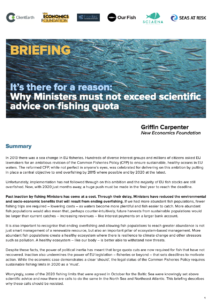In 2013 there was a sea change in EU fisheries. Hundreds of diverse interest groups and millions of citizens asked EU lawmakers for an ambitious revision of the Common Fisheries Policy (CFP) to ensure sustainable, healthy oceans in EU waters. The reformed CFP, while not perfect in anyone’s eyes, was celebrated for delivering on this ambition by putting in place a central objective to end overfishing by 2015 where possible and by 2020 at the latest.
Unfortunately, implementation has not followed through on this ambition and the majority of EU fish stocks are still overfished. Now, with 2020 just months away, a huge push must be made in the final year to reach the deadline.
Past inaction by fishing Ministers has come at a cost. Through their delay, Ministers have reduced the environmental and socio-economic benefits that will result from ending overfishing. If we had more abundant fish populations, fewer fishing trips are required – lowering costs – as waters become more plentiful and fish easier to catch. More abundant fish populations would also mean that, perhaps counter-intuitively, future harvests from sustainable populations would be larger than current catches – increasing revenues – like interest payments on a larger bank account.
It is also important to recognise that ending overfishing and allowing fish populations to reach greater abundance is not just smart management of a renewable resource, but also an important pillar of ecosystem-based management. More abundant fish populations create a healthy ecosystem where there is resilience to climate change and other stressors such as pollution. A healthy ecosystem – like our body – is better able to withstand new threats.
Despite these facts, the power of political inertia has meant that large quota cuts are now required for fish that have not recovered. Inaction also undermines the power of EU legislation – fisheries or beyond – that sets deadlines to motivate action. While the economic case demonstrates a clear ‘should’, the legal status of the Common Fisheries Policy requires sustainable fishing limits in 2020 as a ‘must’.
Worryingly, some of the 2020 fishing limits that were agreed in October for the Baltic Sea were knowingly set above scientific advice and now there are calls to do the same in the North Sea and Northeast Atlantic. This briefing describes why these calls should be resisted.
Griffin Carpenter
New Economics Foundation
Download Summary: Why Ministers must not exceed scientific advice on fishing quota ENG (2 pages)
Download It’s There For A Reason: Why Ministers must not exceed scientific advice on fishing quota (10 pages)

